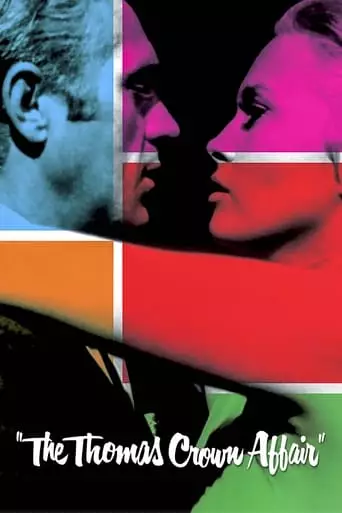
The Thomas Crown Affair (1968) Watch Online Free
Young businessman, Thomas Crown is bored and decides to plan a robbery and assigns a professional agent with the right information to the job. However, Crown is soon betrayed yet cannot blow his cover because he’s in love.
The Thomas Crown Affair (1968) is a stylish heist film that combines elements of suspense, psychology, and romance. The movie follows Thomas Crown (Steve McQueen), a wealthy businessman with a passion for thrills. Bored with his life, he masterminds an elaborate bank heist involving the theft of a large sum of money. The plan is executed flawlessly, but the story takes an interesting twist when Vicki Anderson (Faye Dunaway), an insurance investigator, is assigned to track down the thief.
The plot deepens as Crown and Anderson engage in a psychological game of cat-and-mouse. While Anderson begins to uncover Crown’s involvement, she also becomes romantically entangled with him, complicating both the investigation and her emotions. As the film unfolds, Crown’s cool demeanor and sophisticated lifestyle are juxtaposed against Anderson’s sharp investigative skills and growing attraction to him. The movie culminates in a surprising twist where Crown uses his intellect to turn the tables, leaving audiences wondering who truly won in this intricate game of power and deception
The themes of The Thomas Crown Affair explore the complexities of power, control, and the nature of human relationships. One central theme is the psychological battle between Crown and Anderson. Throughout the movie, Crown is portrayed as a man who thrives on challenges and control, whether in business or his personal life. His heist is not about financial gain, but about the intellectual stimulation it provides.
Meanwhile, Vicki Anderson is not just a typical investigator; she is also a woman grappling with her emotions and professional integrity. Their interactions, particularly the chess scene, highlight the tension between intellectual attraction and emotional involvement. The cat-and-mouse dynamic between the two, combined with their mutual desire for power and control, makes their relationship more complex and intriguing than a mere romantic subplot.
Another key theme is betrayal, which director Norman Jewison highlighted as central to the film’s emotional core. Anderson’s role as both a lover and an investigator places her in a position of dual loyalty, where personal emotions collide with professional duty
The Thomas Crown Affair was groundbreaking in its use of innovative cinematography and editing techniques. Director Norman Jewison, along with cinematographer Haskell Wexler, employed split-screen shots and unconventional angles to convey simultaneous actions, creating a visually dynamic experience for viewers. These techniques were not only novel for their time but also added a layer of sophistication and suspense to the storytelling
Additionally, the film’s unforgettable theme song, “The Windmills of Your Mind,” composed by Michel Legrand, became iconic and won the Academy Award for Best Original Song in 1968. The song’s haunting melody perfectly complements the film’s moody, cerebral atmosphere
The film’s portrayal of the upper class and the lavish lifestyles of its characters resonated with the cultural mood of the 1960s, which saw a shift toward more complex, anti-heroic protagonists in cinema. Steve McQueen’s portrayal of Thomas Crown as a cool, enigmatic figure became one of his most iconic roles
After watching The Thomas Crown Affair, you’ll likely be left with a mixture of awe and contemplation. The film’s intricate narrative and its exploration of human behavior, power dynamics, and betrayal create a lingering impact. The tension between Crown and Anderson, combined with the film’s elegant cinematography and memorable music, makes it a sensory experience that sticks with you long after the credits roll.
You may feel a sense of admiration for the characters’ intelligence and resourcefulness, as well as a slight melancholy due to the film’s exploration of love, deception, and the moral ambiguity of its characters. The film’s ending, which leaves the question of who ultimately “wins” unanswered, will likely provoke reflection on the nature of gamesmanship and the emotional costs of personal ambition
